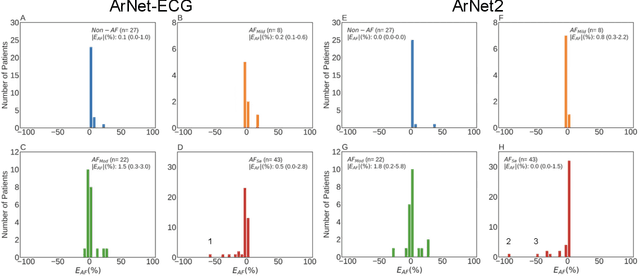ArNet-ECG: Deep Learning for the Detection of Atrial Fibrillation from the Raw Electrocardiogram
Paper and Code
Aug 22, 2022



Atrial fibrillation (AF) is the most prevalent heart arrhythmia. AF manifests on the electrocardiogram (ECG) though irregular beat-to-beat time interval variation, the absence of P-wave and the presence of fibrillatory waves (f-wave). We hypothesize that a deep learning (DL) approach trained on the raw ECG will enable robust detection of AF events and the estimation of the AF burden (AFB). We further hypothesize that the performance reached leveraging the raw ECG will be superior to previously developed methods using the beat-to-beat interval variation time series. Consequently, we develop a new DL algorithm, denoted ArNet-ECG, to robustly detect AF events and estimate the AFB from the raw ECG and benchmark this algorithms against previous work. Methods: A dataset including 2,247 adult patients and totaling over 53,753 hours of continuous ECG from the University of Virginia (UVAF) was used. Results: ArNet-ECG obtained an F1 of 0.96 and ArNet2 obtained an F1 0.94. Discussion and conclusion: ArNet-ECG outperformed ArNet2 thus demonstrating that using the raw ECG provides added performance over the beat-to-beat interval time series. The main reason found for explaining the higher performance of ArNet-ECG was its high performance on atrial flutter examples versus poor performance on these recordings for ArNet2.
 Add to Chrome
Add to Chrome Add to Firefox
Add to Firefox Add to Edge
Add to Edge